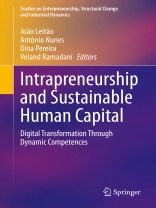This book elaborates on the combined challenges regarding intrapreneurship, sustainability of human resources management (HRM) and digital transformation faced by today’s organizations. Representing the first such attempt in current management literature, it explores the sustainable HRM approach, which focuses on connecting internal and external factors so as to achieve positive outcomes not only for the respective organization but also for the society, economy, and environment. It also discusses cases related to HRM’s role in establishing a corporate sustainability culture, while also working to promote employee engagement, satisfaction, performance and well-being. In closing, the book discusses the new opportunities provided by digitalization and connectivity in the field of intellectual capital, which make employees the central focus of the organization in order to create sustainable competitive advantages.
สารบัญ
Insights for a new research agenda on the Behavioural Theory of the Firm.- Part I.- Intrapreneurship, Human Capital and Work Behaviour.- Non-economic Organizational Performance of SMEs: Is there a Rationale for a Cognitive Entrepreneur?.- The impact of innovative working behaviour on employees’ working performance.- Strategic entrepreneurship and its effect on human capital and employee retention.- Linkages between cognitive and behavioral competences to assess the organizational dominant logic.- Toward the Creation of Intrapreneur-friendly Organization.- Links and Demographic Comparisons to Conflict Management and Counterproductive Work Behavior.- Part II.- International Benchmarks and Experiences.- Human Capital: The Future for Developed Nations and Brain Drain for Developing Countries – Case Study of Bosnia and Herzegovina.- Education, Gender, and Entrepreneurial Intention: The Case of Mexico.- Knowledge accumulation and management as a generator of resources and dynamic capabilities of organizational effectiveness, behavior, and performance.- Who’s winning the ‘Survivor’ Race? Gazelle or Non-Gazelle Startups.- Part III.- Organizational challenges for Family Business.- The innovative performance of family businesses: an essay about intellectual capital and absorptive capacity.- Family management and firm performance – The interaction effect of technological innovation efficiency.- Innovation and Internationalization as efficiency engines for Family Businesses: Analyzing the case of Portugal.- CEO’s Entrepreneurial Profile and Survival of Internationalized Wine Sector SMEs in Portuguese Region of Ribatejo.- Socioemotional wealth and financial performance and their impact on innovation initiatives in Mexican family businesses: A case study.
เกี่ยวกับผู้แต่ง
João Leitão holds a Habilitation in Technological Change and Entrepreneurship, University of Lisbon, Instituto Superior Técnico, and a Ph.D. in Economics, University of Beira Interior (Portugal). Since 1999, he is an Assistant Professor (tenured) in Economics and Entrepreneurship. He is a research fellow of the NECE – Research Center in Business Sciences, associate researcher of the CEG-IST & ICS, University of Lisbon (Portugal), and external research fellow of the Instituto Multidisciplinar de Empresa, University of Salamanca (Spain). His research work has been published in several leading scientific journals. He is member of distinguished editorial and reviewer boards of indexed international journals. He is editor of the Springer Book Series: ‘Studies in Entrepreneurship, Structural Change and Industrial Dynamics.
António Nunes holds a Ph.D. in Economics from the University of Beira Interior (UBI Portugal). He is assistant professor at UBI lecturing on human resources management and organizational behavior for undergraduate and graduate courses. He is also a researcher at the NECE research center, University of Beira Interior, Portugal. His work has been published in several respected journals and as book chapters.
Dina Pereira holds a Ph.D. in Industrial Engineering from University of Beira Interior (UBI Portugal), and is the manager of the incubator and accelerator ‘UBImedical’. Previously, she had worked as researcher at Instituto Superior Técnico (CEG-IST) – University of Lisbon and coordinated the IP Office at the Division of Research and Development of University of Beira Interior, where she was also responsible for EU Fundraising. She is author and co-author of a set of publications in entrepreneurship, innovation and coopetition.
Veland Ramadani is Professor of Entrepreneurship and Family Business at Faculty of Business and Economics, South-East European University, North Macedonia. His research interests include entrepreneurship, small business management and family businesses. He authored or co-authored around 120 research articles, 10 textbooks and 14 edited books. He has published in Journal of Business Research, International Entrepreneurship and Management Journal, International Journal of Entrepreneurial Behavior & Research, Technological Forecasting and Social Change, among others. Dr. Ramadani has recently published the co-edited book Organizational Mindset of Entrepreneurship (Springer). Dr. Ramadani is co-Editor-in-Chief of Journal of Enterprising Communities (JEC). He has received the Award for Excellence 2016 – Outstanding Paper by Emerald Group Publishing. In addition, Dr. Ramadani was invited as a keynote speaker in several international conferences and as a guest lecturer by President University, Indonesia and Telkom University, Indonesia. In 2017, he was appointed as a member of Supervisory Board of Development Bank of North Macedonia, where for ten months served as an acting Chief Operating Officer (COO).












